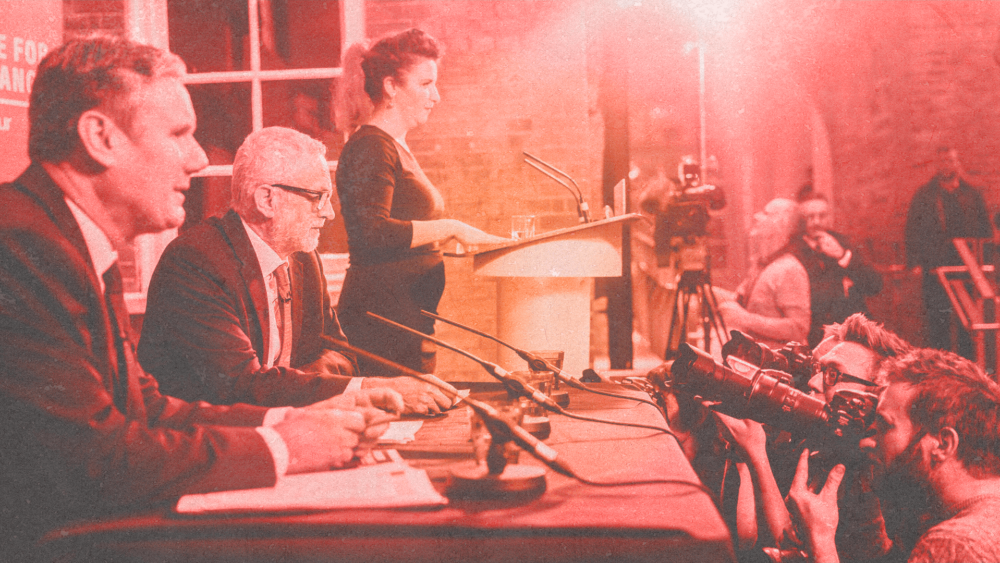“What is needed is a pop-up party with the primary aim of changing the electoral system. You might think that that is an impossible task. Maybe, but there are weaknesses in the current situation that could be exploited”
When Liz Truss spectacularly blew up the UK economy, the opinion polls were putting the Conservatives at wipe-out levels. You would think that that would be a cause for celebration. An inept government that had caused so much destruction was about to come to an end. But it made me, and I suspect a lot of others, depressed more than anything else. Though in one way nothing could be better than a change of government, in another way it feels as if nothing is likely to change given the nature of the Labour Party and the system we live in. So, what are my problems with them?
Dealing with Corbynism
Firstly, Labour’s leader Keir Starmer’s failure to come to terms with Corbynism. As we know he was in the shadow cabinet and backed Jeremy Corbyn at the time. He then stood on the platform of keeping to the Corbyn manifesto. I can understand that he wants to distance himself from the previous leader and there were many weaknesses in the Corbyn project, but it still leaves a question mark over his relationship with that project and leaves him wide open to attack from the Tories.
The general excuse the Starmerites use is that the last election results prove the need to ditch Corbynism. But the truth is that you never know exactly why an election is won or lost. I would have said that, in the last general election, the failure to make or maintain a credible Brexit policy, the failure to deal adequately with the anti-Semitism problems, and the fact that Corbyn was seen as too weak on defence and too metropolitan were more significant than the economic or social positions (some of which were even stolen by Boris Johnson). Keir Starmer seems to be allowing the Tories to say that the Corbyn project was a total failure. But then the implication is that he, Starmer, was either stupid or duplicitous.
Brexit revisited
My second problem is Starmer’s failure to come to terms with Brexit. From holding out for a second referendum and refusing any compromise with Teresa May (which is understandable to me as an ardent Remainer) he suddenly instructed the party to back a bad version of Brexit that is a lot worse than those he had previously rejected. Now, the mantra is “make Brexit work”, but everyone knows by now that Brexit is a disaster.
Again, he lays himself open for attacks by the Tories and allows them to rewrite history as being champions of the will of the people against undemocratic Remainers. In the last Prime Minister’s Question Time he could have hammered home the fact that the UK is the only major economy to practically go into recession. But then he would have to admit that the UK is suffering economically because of Brexit and needs to restore some kind of relationship with the rest of Europe. Again, everything appears so duplicitous.
Muscular unionism
Another issue I have is the failure to understand the changes in national identity in the UK. On a weekly basis we see Starmer on the TV with a giant Union Jack in the background which is reminiscent of the old National Front political broadcasts.
In effect he seems to be aping the muscular unionism of the Tories. If he thinks he will appeal to the whole of the UK, he is very much mistaken. That ship has sailed. How Labour does in Scotland and Wales will depend on the local leaders and parties and not on him.
This muscular unionist policy is disdainful to Scotland (and Wales). Starmer has said that if he is unable to get an overall majority in the next election, he is willing to run a minority government rather than cooperate with the SNP and agree to an independence referendum. Not only is it totally unreasonable and undemocratic not to work with the majority party: in Scotland it would also be an incredibly chaotic way to run a government. Secondly it is totally undemocratic to refuse the people of Scotland a second independence referendum given the way people in Scotland have voted.
Recently the long-awaited Gordon Brown’s Commission on the UK’s Future Report came out. I was expecting some kind of federal proposal for the UK. However, there is very little in it for Scotland. Instead, there were some vague references to Entrenching Devolution, some immunity protections for MSPs, and the devolving of Job Centres. Hardly earth-shattering stuff and hardly up to the task of protection against Westminster power grabs as has been seen recently with the Gender Recognition Act.
The only thing that caught my eye was the possibility for Scotland to be able to make its own international treaties with UNESCO, Nordic Council and possibly even the EU. And then for Wales there is even less: job centres, youth justice and the probation service is about it. And what about England? There is a dire need to grasp and nurture a patriotic, progressive English identity, before it gets taken over by the far right.
The report makes much of the reform of the House of Lords which apparently is meant to restore faith in democracy. The plans are for a smaller elected Second Chamber with more representation from the nations and regions of the UK. But the details are vague and look more like something that will be kicked into the long grass rather than appear in the next manifesto.
Economy and Austerity 2.0
What about the economy? Starmer is having some success here. Things like pushing for the windfall tax and ending the non-domicile tax break. I think most people will give him credit if he manages to come up with plans to lessen the pain of the cost-of-living crisis. However, listening to his speech to the CBI recently, I noticed there was a lot of talk about sound money and living within our means. Now that sounds very much to me like this is austerity 2.0 of some sort.
Electoral reform
Then we get to electoral reform. The UK is in dire need of moving to a PR system since the current ‘First Past the Post’ is proven not to work. The current Conservative government has a majority of 80 seats on 43 percent of the vote. Sometimes a party can win on 30 percent of the vote. The main argument against PR is that smaller parties will hold the balance. Well, that is only true if the electorate have voted for that situation and is that worse than different factions within the same party manipulating and isolating the other, or one faction deliberately sabotaging the party’s chances in a fit of pique?
I would say that the current system disenfranchises a lot of the electorate who don’t necessarily agree with either of the two main parties. PR would at least allow other parties to put their programmes and policies in front of the electorate even if after the election they had to cooperate with others to form a government. It is appalling that a motion of PR was passed in the Labour conference and yet Starmer has decided to ignore it.
The next election
From the above points, Starmer is not certain to win the next election. His personal ratings aren’t that good, and he has a lot of the untrustworthy feel of Neil Kinnock about him. To become the largest party, Labour needs to win 80 seats which would require an 8-point swing. If the 8-point swing happens in Scotland as well (which is unlikely) they could gain another 20 seats. The most likely outcome is that Scotland remains basically the same. Without Scotland, to win the next election outright Labour needs to win 145 seats or 14-point swing in England which would be larger than in the famous Clement Atlee’s 1945 election.
Current polling suggests a 20+ pt lead for Labour in which they would gain 163 seats and could indeed govern without any coalition. However, in a General Election that would likely narrow as local factors and tradition kick in. The most recent by-election produced a swing of 10pts to Labour in one of their safe seats. That would probably be a better indicator and would result in a hung parliament.
There certainly isn’t the kind of buzz around Starmer that there was before Tony Blair’s landslide victory. But even if Starmer did get in then I think he will inevitably be a disappointment and won’t even start to address the real and many problems facing the country. Then five years later, after the following election, we will be back to Tory chaos, and a government perhaps voted in on less than 30 percent of the popular vote.
Should the left, and indeed, democrats, back Keir Starmer in the next general election? No, they shouldn’t touch him with a bargepole. The red line for me is lack of reform of the electoral system.
Now, to clarify I am not a member of the Labour Party, I am a member of Plaid Cymru, but I admire a lot of Labour MPs like John McDonnell and Clive Lewis and Mark Drakeford. These are all people who have addressed the points I’ve mentioned above. I have no issue with people voting Labour in Wales and Scotland where there is Proportional Representation and a choice of parties on the left. If people genuinely support 60 percent plus of Keir Starmer’s program then, fine – continue to support him. But if on the other hand it is nearer to 20 percent then perhaps people should think again. I greatly resent the fact that 120,000 people who have left the party since Starmer took over are disenfranchised and that the Green Party is hardly represented in parliament.
One of the reasons people are remaining loyal to Labour is just that – loyalty. Owen Jones in one of his podcasts said he was going to support Labour even though a Starmer government would be disastrous and lead to the far-right getting in in the following election. This on the grounds that is a first past the post system, and he believes in class politics so wouldn’t support the Greens.
Some people believe that Starmer will become more radical once in power. I thought the same about Tony Blair, but the opposite was true. The party shifted relentlessly to the right based on milking a winning formula and that more people on the left of the party decided to cancel their membership.
Breaking the wheel
As Daenerys Targaryen from Game of Thrones would say: The wheel needs to be broken and it needs to be broken now.
What is needed is a pop-up party with the primary aim of changing the electoral system. You might think that that is an impossible task. Maybe, but there are weaknesses in the current situation that could be exploited. For one thing, Keir Starmer is desperate to be prime minister and will do anything to achieve that; then, the system is volatile and there is some scope for pop-up parties to succeed when in the past they wouldn’t have; and, thirdly, the existing first-past-the-post electoral system means that only marginals really count.
My suggestion is that this proposed pop-up party should aim to target and put all its resources into standing in the 20 or so most marginal seats some of which could change hands on very few votes. And by stating that aim now it would leave the option to pull out of the contest if Starmer is willing to bring in Proportional Representation. If Starmer refused to budge, then the party would need to carry out that threat of targeted standing in marginal seats with the aim of forcing a hung parliament. I know that it is a risk and a bit destructive if carried out, but my feeling is that Starmer, given his nature, will cave in. Maybe a party with democracy in its name is the one to do it.
Do you want to be informed of DiEM25's actions? Sign up here















